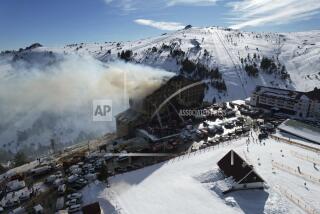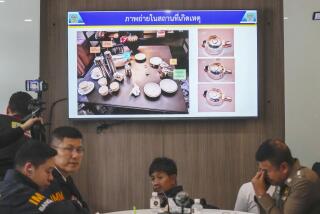Six killed in assault on Kabul hotel
- Share via
KABUL, AFGHANISTAN — Striking at a prime symbol of the Western presence in Afghanistan, assailants armed with grenades, assault rifles and suicide vests stormed a heavily fortified luxury hotel in the heart of the capital Monday. The carefully coordinated assault killed at least six people, leaving trails of blood in the marble-floored lobby and forcing terrorized guests to cower behind locked doors or in the basement awaiting rescue.
The attack on the Serena Hotel, an incongruously deluxe five-star establishment in rundown Kabul that is frequented by foreign delegations, Western aid workers and high-ranking Afghan officials, was the boldest such assault in recent memory.
The U.S. State Department said that one American, not a government employee, was among those killed. The victim’s name was not immediately released because relatives had not yet been notified.
Another victim was a Norwegian journalist covering the visit to Kabul by Norway’s foreign minister. Carsten Thomassen of the Dagbladet newspaper died from injuries sustained in the attack, according to the Committee to Protect Journalists.
“We mourn the loss,” CPJ Asia program coordinator Bob Dietz said. “Foreign and local journalists face numerous threats in countries like Afghanistan, where security is a rare commodity.”
Norwegian Foreign Minister Jonas Gahr Stoere, who was also staying in the hotel, was unhurt, news agencies reported, citing Norway’s public broadcaster NRK. Several Norwegian journalists and embassy officials were believed to have been in the hotel at the time of the attack, apparently carried out by at least four assailants.
The Taliban, which was ousted from power by U.S.-led forces in 2001, claimed responsibility for the attack almost as soon as it had taken place Monday night. In a city where most people hurry home before dark, many were unaware that the assault had occurred.
A U.S. military official in Kabul, interviewed on condition of anonymity because he was not authorized to speak to the press, said dozens of American troops in Humvees converged on the hotel after receiving a panicked call for help from Afghan counterparts shortly after 6:15 p.m.
The 177-room hotel, in the center of a busy Kabul district and almost adjacent to the presidential palace, is walled off and guarded with a fortified gate and blast barriers. The lobby is set back from the street entrance to the hotel compound, and all vehicles are searched before entering.
Many expatriates and Afghan officials use the Serena’s well-equipped gym, and Western embassies and military officials often avail themselves of its conference rooms and restaurants for meetings.
It was thought to be the first direct attack on the multimillion-dollar hotel, which opened its doors in 2006, charging as much for a single night’s stay as many Afghans make in a month or even a year.
Early accounts of the chaotic sequence of events were sketchy and sometimes contradictory, but witnesses said they heard at least one loud explosion followed by gunfire, then another, closer blast. One of the dead was believed to be a female employee at the hotel gym, in the wing of the building closest to the front entrance.
Employees quickly herded guests into the basement or warned them to stay in their rooms with the doors locked. An American aid worker who was inside the hotel told the Associated Press of terrified gym patrons huddling in the locker room, hoping they would not be found by the assailants.
“We heard gunfire, a lot of it,” said Suzanne Griffin, who works for the U.S.-based nonprofit group Save the Children. “We all just sat on the floor and got as far as we could from any glass. . . . We turned our phones on silent.”
News agencies quoted a Taliban spokesman, Zabiullah Mujahid, as claiming responsibility for the assault and saying at least one of the four assailants had blown himself up. Others taking part in the attack managed to flee, he said.
Authorities quickly sealed off the scene, which was illuminated by the flashing lights of emergency vehicles. Troops were conducting a door-to-door search of the hotel in case one or more of the gunmen were still at large.
The assailants apparently managed to breach the outer security barriers and quickly scatter, carrying out separate attacks in the hotel’s public areas before guards were able to rally.
“There were two or three bombs, and there was complete chaos,” Norwegian journalist Stian Solum told NRK. “A bomb went off. . . . There were shots fired.”
Stoere, the Norwegian foreign minister, had called senior embassy staffers to a meeting at the hotel that was in progress at the time of the attack, news agencies reported.
Kabul had remained relatively safe through 2005, even as the situation deteriorated in the countryside, but attacks in the capital have steadily edged upward in the last two years.
Suicide bombers have mainly targeted Afghan security forces rather than trying to penetrate well-guarded embassy compounds or the headquarters of NATO-led forces, who number about 40,000 and include about 11,000 U.S. troops.
Approximately 12,000 more U.S. troops are in Afghanistan under separate command.
Taliban militants battling the Western troops have been unable this year to seize large new swaths of territory, but have managed to make many parts of the country unsafe for development and reconstruction workers, hampering efforts to rebuild in the wake of decades of warfare.
Last year, a record-setting 140 suicide attacks took place in Afghanistan, most of them targeting Afghan and Western forces, but also leaving hundreds of civilians dead and injured.
--
Special correspondent Faiez reported from Kabul and Times staff writer King from Dubai, United Arab Emirates. Times staff writer Paul Richter in Washington contributed to this report.
More to Read
Sign up for Essential California
The most important California stories and recommendations in your inbox every morning.
You may occasionally receive promotional content from the Los Angeles Times.










